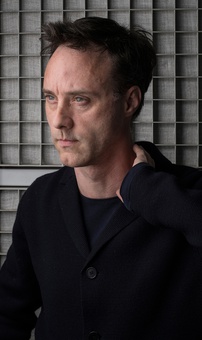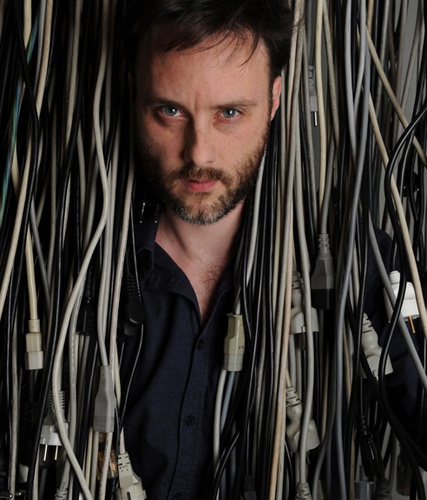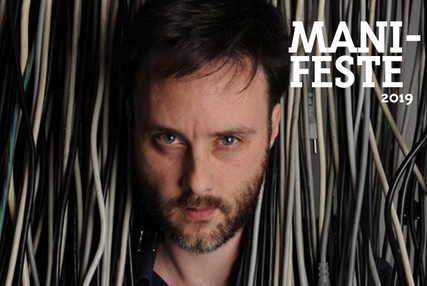Campo Abierto
Perspectives - Enjeux artistiques
 Depuis ses débuts de compositeurs, Roque Rivas trouve dans les autres disciplines artistiques, et principalement les arts visuels et l’architecture, un formidable réservoir d’idées musicales. Non pas tant des sources d’inspiration au sens premier du terme (si ces disciplines l’inspirent, il se refuse à toute illustration musicale), mais des sources d’intuitions, de manières de penser divers aspects de la composition : l’espace, l’harmonie, les couleurs…
Depuis ses débuts de compositeurs, Roque Rivas trouve dans les autres disciplines artistiques, et principalement les arts visuels et l’architecture, un formidable réservoir d’idées musicales. Non pas tant des sources d’inspiration au sens premier du terme (si ces disciplines l’inspirent, il se refuse à toute illustration musicale), mais des sources d’intuitions, de manières de penser divers aspects de la composition : l’espace, l’harmonie, les couleurs…
Pour Campo Abierto, littéralement « champ ouvert », Roque Rivas se penche ainsi sur la problématique de la perception des volumes et des distances, à commencer par la perspective, qu’il transpose à la composition pour repenser la spatialisation du discours musical, en appliquant par exemple le principe de points de fuite à la répartition des différents partiels d’un spectre sonore pour créer des effets d’éloignement et de rapprochement d’une source.
© Jeremy Garamond / EIC
« Dans le domaine des arts visuels, les artistes disposent de plusieurs moyens de traiter la perspective. Si les points de fuite sont l’un des plus connus, on a aussi ce qu’on appelle la perspective aérienne ou perspective atmosphérique, qui consiste à marquer la profondeur de l’espace par le dégradé progressif des couleurs et l’adoucissement progressif des contours. Ainsi, le matériau spectral harmonique peut contribuer à suggérer la distance de la même manière que les couleurs froides : à puissance égale, un spectre riche a tendance à être perçu comme provenant de tout l’espace, tandis qu’un spectre plus réduit est perçu comme plus localisé. ».
S’agissant de couleurs, Roque Rivas trouve également des idées de grammaire harmonique dans chez un Joseph Albers (1888-1976). Peintre du Bauhaus, ce dernier a beaucoup travaillé sur l’interaction des couleurs du point de vue de la perception des formes et des volumes. Il donne par exemple une impression de relief à une image en deux dimensions grâce à la juxtaposition de différentes couleurs : selon la manière dont on colorie les faces d’un cube en 2D, notre perception de ce cube change. Le compositeur s’intéresse aussi à la mise en abyme, à la distorsion par anamorphose, aux miroirs convexes ou concaves, etc.
Repenser la spatialisation - Enjeux technologiques
S’agissant de perspectives et, surtout, de perception de perspectives, l’un des principaux enjeux technologiques de Campo Abierto est bien sûr la spatialisation. Si le dispositif de diffusion sonore choisi semble assez classique (des enceintes réparties autour du public, et une couronne au plafond), Roque Rivas et son réalisateur en informatique musicale (RIM) Augustin Muller ont fait quasi table rase de leurs connaissances en termes de spatiaslition, bâtissant une nouvelle pensée de l’espace sonore qui s’appuie avant tout sur ce qui est « sensible » et « perceptible ». Une pensée de la spatialisation qui s’intéresse moins aux « trajectoires » des sons qu’à la distribution spatiale de spectres, d’accords ou même de rythmes, et à l’impact de l’évolution de cette distribution sur nos perceptions de l’harmonie ou de l’espace sonore.
« Ça va dans les deux sens, dit Roque Rivas. Si je distribue un accord dans l’espace (sur des enceintes ou grâce à la répartition des musiciens sur scène) puis que je change cette distribution, on a le sentiment que l’accord perdure, mais que sa couleur se nuance de même que son occupation de l’espace. À cet égard, le principe de la perceptive est avant tout une manière de tromper nos sens (l’œil en peinture, l’oreille en musique) : on recrée trois dimensions à partir d’une surface plane. En jouant sur le placement d’un point de fuite, on peut créer des effets d’anamorphose, des déformations, etc. Notre premier travail a donc été de formaliser le comportement spatial d’une matière sonore donnée par rapport à chaque type de mouvement. Un travail avant tout empirique qui a exigé de nombreux tests sur des partiels, et même des sinusoïdes, pour établir des stratégies formelles d’écriture de l’espace. Trop souvent, s’agissant de spatialisation, les processus sont trop sophistiqués ou le lieu de représentation pas adapté, et l’on ne peut vraiment entendre le travail effectué. Je veux quant à. moi que tout soit audible. »
Précedants projets à l'Ircam
2012 – Assemblage pour ensemble, 16 mn
2010 –About cages pour ensemble, 4 mn 33 s
2008 – Mutations of matter pour cinq voix, électronique et vidéo, 14 mn, avec Carlos Franklin
2007 – Conical intersect pour basson et électronique, 7 mn
Images d'une œuvre n° 15 : Assemblage de Roque Rivas
Images d'une œuvre n° 15 : Assemblage de Roque Rivas





